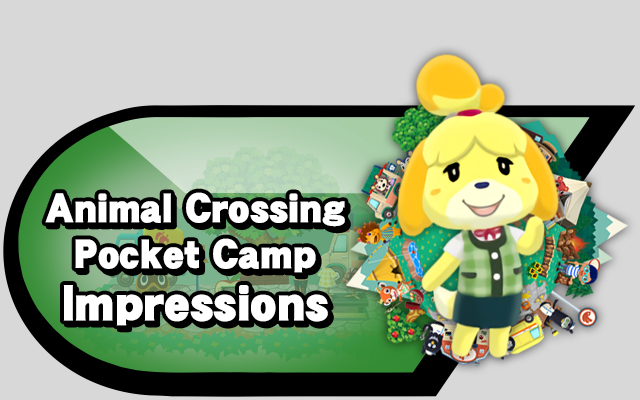A game that was seemingly MIA for a while and had nothing in the wake of the enormously successful Fire Emblem BUY ALL OUR ORBS PLEASE Heroes, the Animal Crossing mobile game has finally arrived in the form of Pocket Camp. The following isn’t a review per se, more like first impressions, since it’s hard to judge a mobile game that’s prone to changing frequently over time. With that said, let’s see how this title stands out on its own.
Right off the bat, there are aspects of mainline Animal Crossing titles that fans should be familiar with, that being your coming in to a new place, character customization (which is much better than previous titles given that it’s more direct), and so forth. The real difference here is scale. It’s not a new town you’re living in now, but a campsite, connecting to different areas that take the place of typical activities like bug catching, fishing, fruit collecting and shopping, so it’s in essence a town, just segmented. These areas are also where you can find and socialize with other animals.
Socializing is once again a key aspect of this Animal Crossing title, but with a twist. The favors you do for them in a mainline game build friendship levels, and thus, experience, a new element for the series. Doing favors and building friendship are your means of levelling up, unlocking new citizens to mingle with and stuff to decorate your campsite and camper with (more on that in a minute). The visual progress given by this system is something I like, whereas in previous games it was only really implicit how good of terms you were on with someone.
Décor is another staple present and accounted for here. Your outdoors campsite and camper vehicle are this game’s house area, so to speak. The campsite is the gathering area for any animals you’ve befriended enough and invited to hang out there, while the camper is more akin to the traditional house in that it can be expanded and given added floors (inexplicably looking the same size from the outside in the process despite having TWO FLOORS). The mobile based system begins to show at this point when you try to get decorations, since you have to wait a select amount of time once you request an item before actually getting it, a process which can be sped up with the premium currency, Leaf Tickets.
To get that topic out of the way, Leaf Tickets are this game’s equivalent to Orbs in Fire Emblem Heroes or Diamonds in Magikarp Jump, and it’s more analogous to the latter. Pocket Camp, being what it is, has no pay to win elements, unlike Heroes, and thus buying extra Leaf Tickets is just a way of making things go faster or getting some of the limited time goodies (at the time of writing, these are Tom Nook and K.K. Slider chairs which let them hang out at your campsite). People were understandably concerned with the inclusion of microtransactions after Heroes’ gargantuan success, but the two aren’t remotely comparable. Where they are comparable, though, is in daily bonuses and missions giving the incentive to play more and get extra materials, Bells or Tickets, so there’s that.
Going on a bit of a tangent, there is some level of player interaction in the game. While nothing mind blowing, it’s more social than the experimental Miitomo could ever hope to be. Other players’ campers will be found frequently between areas (campers of those on your Friends List are given higher priority), which you can visit, and their campsite by proxy. Friends serve two other functions as well: entering the Shovelstrike Quarry area for extra Bells and materials, requiring assistance from five friends, and the Market Box function, letting players sell items like fruit, fish and bugs for Bells (which can also be done between any player). It’s no New Leaf, but it’s something.
Overall, though, Pocket Camp has enough of the Animal Crossing spirit to merit a download. It’s arguably a better entry game to its home franchise than, say, Pokémon Go is to Pokémon. It’s still diabetes-inducingly cute, and mobile does nothing to really butcher the experience. It will likely get even better with time, so keep it in mind even if you don’t jump on the train (or rather, camper) right away.








